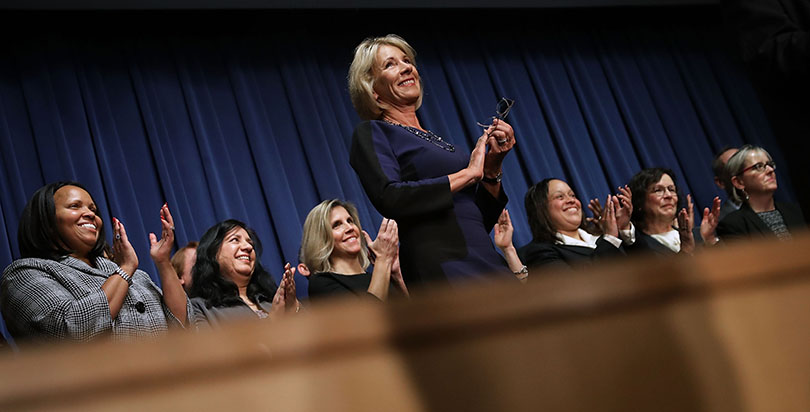Whitmire: Dear Secretary DeVos, If You Want to Grow Great Charter Schools, Do This, Not That

This is the second in a series of essays in which policy experts, educators and journalists discuss their take on top priorities now that U.S. Secretary of Education Betsy DeVos is on the job. Read the others here.
The charter schools I profile in the recently published book The Founders: Inside the Revolution to Invent (and Reinvent) America’s Best Charter Schools definitely warrant rapid expansion. Most needed: billions for building new schools.
So why am I so uneasy?
Part of my worry arises from listening to school choice advocates, including President Trump, talk up the value of free market competition in education.
“Competition is why I’m very much in favor of school choice,” Trump wrote. “Let schools compete for kids. I guarantee that if you forced schools to get better or close because parents didn’t want to enroll their kids there, they would get better. Those schools that weren’t good enough to attract students would close, and that’s a good thing.”
Problem is, as I discovered in The Founders, the pressure of competition — a force that works so well in the world of commerce — wasn’t really at the heart of what led to the creation of top charters.
(My definition of top charters: schools that add a year and a half of learning per year, enough to catch up kids who enter school far behind. That’s a feat accomplished by roughly a fifth of the 6,700 charters in the nation.)
Not only did I conclude that competition was not the key player, I also found, to my surprise, that applying a startup mentality to schools doesn’t always work as well as expected. That insight came after spending a year following the expansion of the Silicon Valley–inspired Rocketship charter schools.
And that’s just the beginning of my worries.
Another reason for concern comes from reading articles critical of DeVos, especially regarding the charter schools she championed in Detroit. The problem with those charters, we are repeatedly told, arises from a lack of tough accountability.
Exacting accountability is absolutely necessary to keep shaky charters from opening and bad charters from persisting. And it’s also necessary for creating the environment that allows great charters to flourish. But in my book research, it wasn’t the key player behind the growth of the great charters I studied. Several of the states that rank high on “best charter laws” lists compiled by charter advocates aren’t home to the very best charters.
In other words, both sides in this battle seem to have it somewhat wrong. Which explains my worries.
Getting it wrong means if DeVos actually gets $20 billion to invest in expanding school choice, and actually persuades states to chip in far more, the odds of wasting that money are high.
Worse than wasting money is the likelihood of ill-designed programs triggering a backlash against all charters, including the very best. That’s the worry that haunts me.
So if competition and accountability can’t explain the evolution of hundreds of high-performing charter schools out there, then what does? And the even more important question: Can the federal government pull any levers to accelerate that magic?
Answering that question requires a little background narrative. I first plunged into the world of charter schools after finishing a book about Michelle Rhee, The Bee Eater. At the time, I considered her strong reforms the last best chance for a troubled urban school district to turn itself around.
However, my deadline got pushed up by months when her protector-mayor, Adrian Fenty, lost his bid for re-election (in part due to Rhee controversies), which triggered her ouster. That’s it, I concluded. Time to throw in the towel on urban districts finding success. Time to check out what charter schools might have to offer — especially the high performers I saw while researching a book about boys falling behind in school.
(With the benefit of hindsight, my pessimism was unwarranted. Against all odds, subsequent mayors retained her reforms, and today D.C.’s traditional public schools are strong enough to hold up against the district’s rapidly growing high-quality charters. Hope persists.)
My first charter school book was On the Rocketship, which followed the rapid expansion of San Jose–based Rocketship charters, a school design that drew heavily on the tech startup lessons of co-founder John Danner, a Stanford-educated electrical engineer who made his fortune in Internet advertising and decided that schools would be his next big thing.
What I learned (re-learned, really) from researching the Rocketship book (as its rapid expansion plans hit a wall) is that creating schools that succeed where traditional schools have failed is really, really hard work and not always guaranteed to succeed. Plus, I learned that unlike software startup companies, schools don’t always adapt well to ferocious, fast-paced changes.
At the same time, however, as Rocketship quickly recovered from its missteps, I learned that Silicon Valley entrepreneurship, including semi-fast-paced changes, can work in the education world. Plus, I learned that schools such as Rocketship, and many other charters willing to try new methods, have an important place at the table.
The next book, The Founders, looked at the origins of some of the nation’s most successful charter groups: Uncommon, KIPP, IDEA, Achievement First, YES Prep and many others. How did they get to be so good? Here is where I learned some more lessons that might come in handy for DeVos and others as they try to prime the school choice pump.
Let’s take Boston as an example. Conventional wisdom holds that Massachusetts has the highest-performing charter schools in the country (it does) because it has the wisest charter authorizing system of any state. That certainly helps, but mostly by keeping bad charters out of the mix. It doesn’t explain why the best grew there.
That history is more complicated and has more to do with people than policy. By lucky happenstance, some of the key players in the nation’s charter school history — Brett Peiser, Evan Rudall, Linda Brown, John King, Doug Lemov, Jon Clark and Norman Atkins — happened to be passing through Boston at the same time, partly thanks to Harvard’s Graduate School of Education. Together, they invented the framework for high-performing charter schools.
Now consider New York. Usually, the credit for the many high-performing charter schools in New York goes to its authorizer, the State University of New York, which has, indeed, done great work.
But SUNY isn’t the reason New York City is brimming with top charters. That credit belongs mostly to former schools chancellor Joel Klein, who concluded that the best way to dramatically improve education there for poor kids was to summon the leaders of the top charter groups and make them offers they couldn’t refuse to set up shop in New York City — free facilities and fast-track approval.
Plus, Klein saw potential in the aspirations of Eva Moskowitz and made sure that her Success Academy charters could expand rapidly. Today, Success Academy schools dominate the city’s best-schools lists.
The charters that Klein reached out to, Achievement First, Uncommon and KIPP, didn’t become great because of great accountability. Their competency and ability to replicate arose from their sense of an urgent educational mission and the willingness to share, as documented in The Founders. Collaboration, not competition, was the key.
And it wasn’t competitive forces that allowed them to expand in New York City. Rather, it was Klein working on their behalf, giving them the facilities they needed to flourish.
One last example: Washington, D.C., where nearly half the students attend charter schools, many of them extremely good at what they do. The credit for the good charters there usually goes to the (very good) charter law devised by Congress and the sole authorizer there, the very professional Public Charter School Board.
But it’s not that simple. From my observation, much of the credit goes to the guiding hand of Scott Pearson, its executive director.
Recently, I researched an article on a unique charter pairing in Washington, where a highly regarded preschool charter group, AppleTree Early Learning, joined hands with a top elementary charter group, Rocketship, to provide high-quality early education that flows seamlessly into kindergarten classes at Rocketship.
How did this come about? Not because of the law, nor because of competition from other charters or preschools, nor accountability, nor Charter School Board regulations. It happened because Pearson pulled aside Rocketship leaders and “suggested” that linking with AppleTree would be a wise way to win approval of their charter. So it happened.
Again, the keys were a guiding hand and collaboration among charters, just as we saw in New York and continue to see in Boston.
So the real question: If the secret sauce behind growing top charters isn’t primarily competition or tough accountability, are there any federal levers to pull to create more high-performing “choice” schools?
The answer is “yes” — but probably not the levers we’ve seen discussed to date.
One wise path would be to dramatically ramp up funding levels for the federal Charter School Program (CSP), especially its push to replicate the best charters. To date, that money has been shrewdly invested (again, the wise guiding hand at work).
Taking the CSP budget from its current $333 million to $1 billion is probably the smartest bet DeVos could make.
The political problem, of course, is that granting the federal government the authority to choose which charter groups are good enough to get funding is far too heavy-handed for an administration devoted to states’ rights. Let the states decide! Enough with the wise federal guiding hand!
A states’ rights–friendly approach calls for block granting to the states: Here’s the money, you decide. This appears to be the first option DeVos will reach for. But block granting is far too clumsy an approach to tap into the forces that caused these top charters to grow.
Block grants might work for vouchers, but based on the track record we’ve seen to date in Louisiana, Wisconsin and Indiana, vouchers will prove to be minor players, lacking the transformational power charters have demonstrated in New York, Washington, Newark, Los Angeles and elsewhere.
So here’s a better option, one that draws on the lessons from success stories in Boston, that would allow top charters to bubble up from the states. A key player in Boston is an independent group, Building Excellent Schools (BES), started by former private school educator Linda Brown as a vehicle for guiding talented educators into the new field of charter schools.
Today, BES fellows — all candidates to launch new charter schools — go through a grueling process of intense observation of top charters across the country. Then they get help, both technical and financial, as they draw up their own charter applications, based on the best lessons learned they observed from the visits. Next step: Launch in their chosen city.
Anyone seeing Brown and BES operate up close asks one question: Why aren’t there more BES-like organizations out there? Actually, there are a few. New Schools for New Orleans, for example, plays a similar role just in that city. BES is great, and it has a national reach, but it has limited capacity.
Why couldn’t DeVos and her team come up with a way to launch BES-like organizations in every region of the country? That would be a win for everyone: transformational schools bubbling up at the local level — states’ rights–friendly.
And in the end, thousands of children get schools that change lives. What’s not to like?
Get stories like these delivered straight to your inbox. Sign up for The 74 Newsletter

;)
